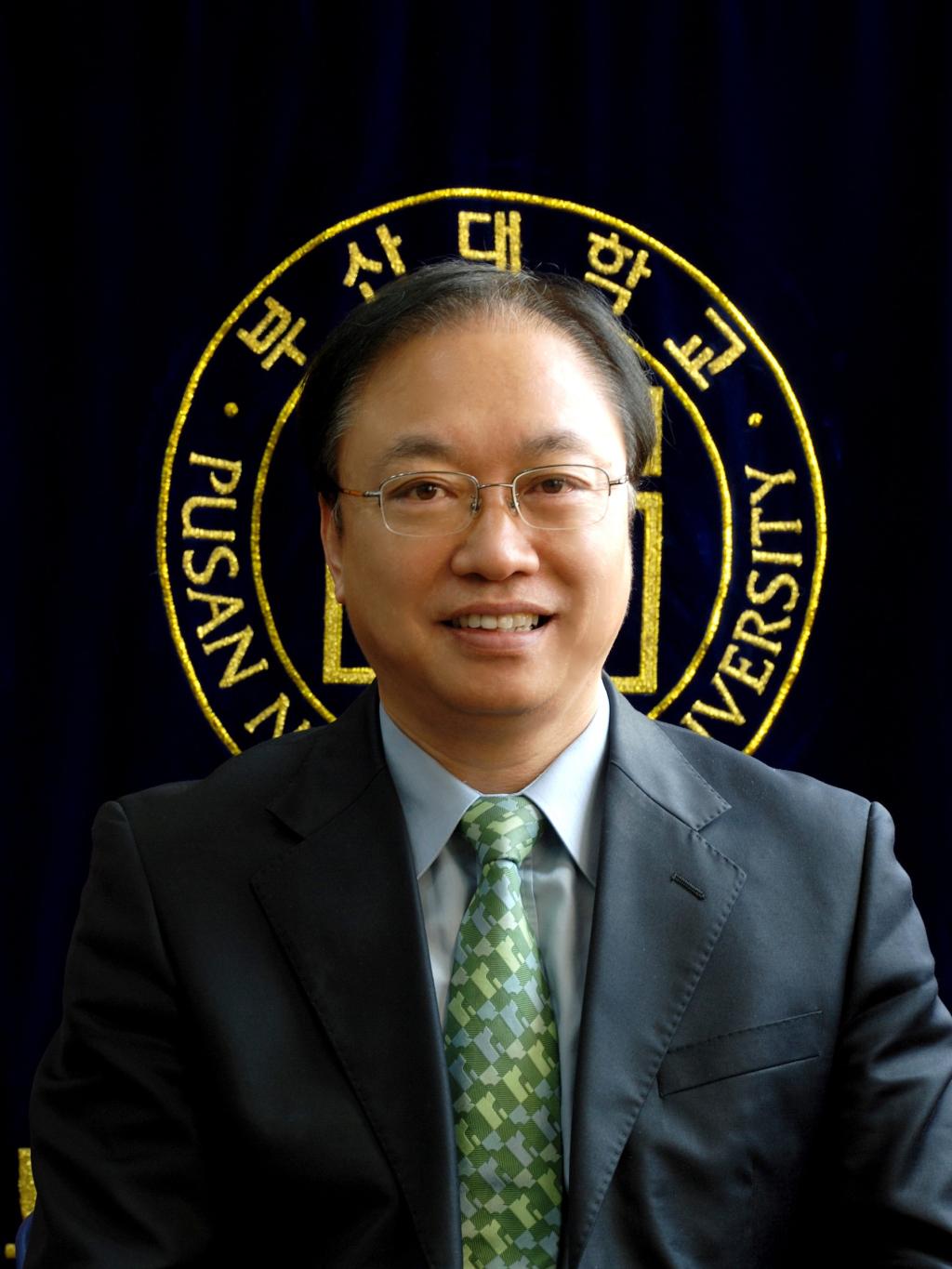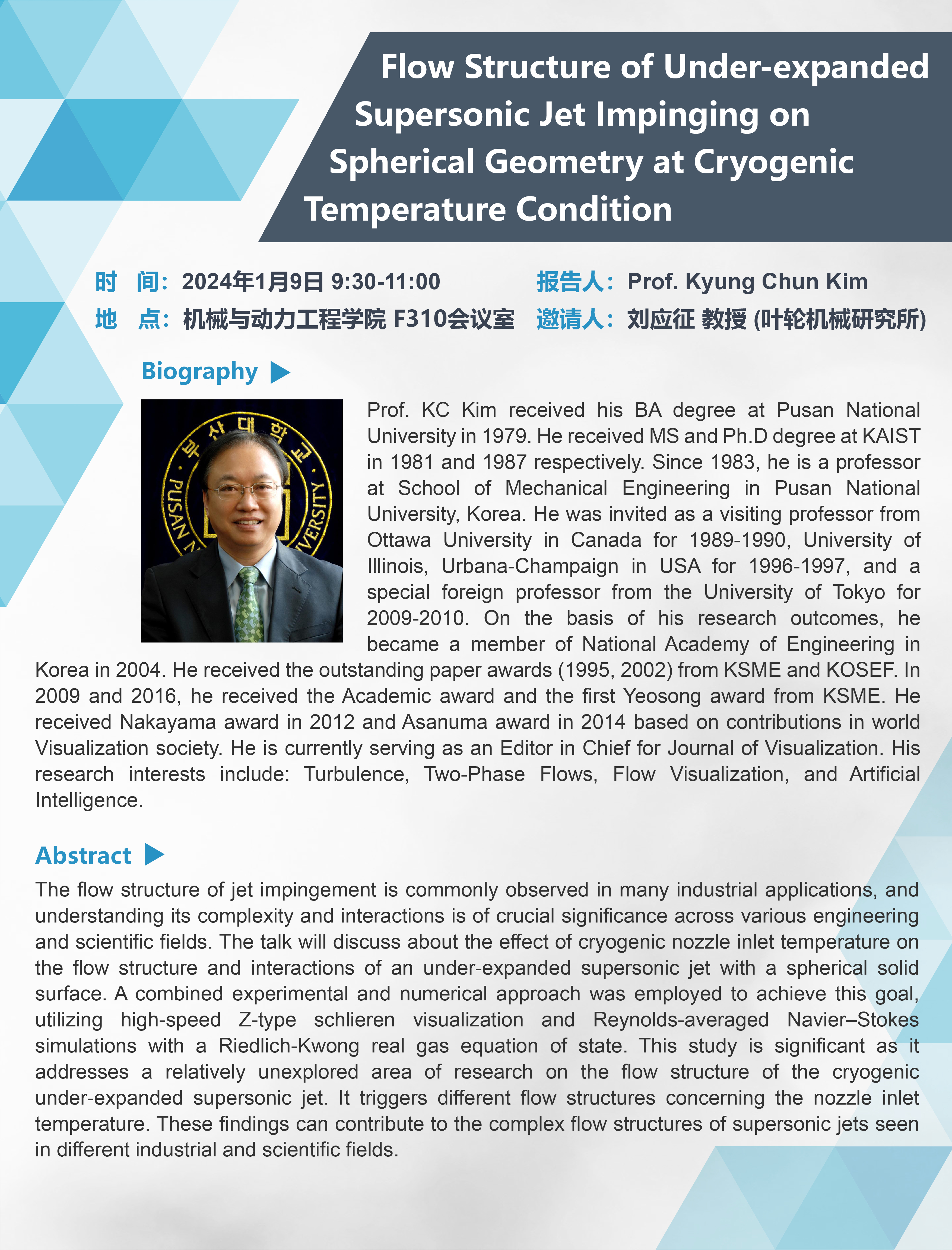

题目:Flow Structure of Under-expanded Supersonic Jet Impinging on Spherical Geometry at Cryogenic Temperature Condition
时间:2024年1月9日 9:30-11:00
地点:德赢vwin055 F310会议室
邀请人:刘应征 教授(叶轮机械研究所)
Biography
 Prof. KC Kim received his BA degree at Pusan National University, Korea in 1979. He received MS and Ph.D degree at KAIST, Korea in 1981 and 1987 respectively. Since 1983, he is a professor at School of Mechanical Engineering in Pusan National University (PNU), Korea. He was invited as a visiting professor from Ottawa University in Canada for 1989-1990. He joined at the department of theoretical and applied mechanics in University of Illinois, Urbana-Champaign, USA as an invited professor for 1996-1997. He was invited as a special foreign professor from the University of Tokyo, Japan for 2009-2010. On the basis of his research outcomes, he became a member of National Academy of Engineering in Korea in 2004. He received the outstanding paper awards (1995, 2002) from KSME and KOSEF. In 2009 and 2016, he received the Academic award and the first Yeosong award from KSME. He received Nakayama award in 2012 and Asanuma award in 2014 based on contributions in world Visualization society. KC Kim was selected as a PNU Distinguished Professor in 2018. In 2019, he received Busan Science and Technology award. He is currently serving as an Editor in Chief for Journal of Visualization. In 2020, he was selected as the director of Regional Leading Research Center for Eco-friendly Smart Ship. His research interests include: Turbulence, Two-Phase Flows, Flow Visualization, and Artificial Intelligence.
Prof. KC Kim received his BA degree at Pusan National University, Korea in 1979. He received MS and Ph.D degree at KAIST, Korea in 1981 and 1987 respectively. Since 1983, he is a professor at School of Mechanical Engineering in Pusan National University (PNU), Korea. He was invited as a visiting professor from Ottawa University in Canada for 1989-1990. He joined at the department of theoretical and applied mechanics in University of Illinois, Urbana-Champaign, USA as an invited professor for 1996-1997. He was invited as a special foreign professor from the University of Tokyo, Japan for 2009-2010. On the basis of his research outcomes, he became a member of National Academy of Engineering in Korea in 2004. He received the outstanding paper awards (1995, 2002) from KSME and KOSEF. In 2009 and 2016, he received the Academic award and the first Yeosong award from KSME. He received Nakayama award in 2012 and Asanuma award in 2014 based on contributions in world Visualization society. KC Kim was selected as a PNU Distinguished Professor in 2018. In 2019, he received Busan Science and Technology award. He is currently serving as an Editor in Chief for Journal of Visualization. In 2020, he was selected as the director of Regional Leading Research Center for Eco-friendly Smart Ship. His research interests include: Turbulence, Two-Phase Flows, Flow Visualization, and Artificial Intelligence.
Abstract
The flow structure of jet impingement is commonly observed in many industrial applications, and understanding its complexity and interactions is of crucial significance across various engineering and scientific fields. This study comprehensively investigates the effect of cryogenic nozzle inlet temperature on the flow structure and interactions of an under-expanded supersonic jet with a spherical solid surface. A combined experimental and numerical approach was employed to achieve this goal, utilizing high-speed Z-type schlieren visualization and Reynolds-averaged Navier–Stokes simulations with a Riedlich-Kwong real gas equation of state. This study is significant as it addresses a relatively unexplored area of research on the flow structure of the cryogenic under-expanded supersonic jet. The study examines the shock pattern and interaction region through varying static inlet temperature (Tin=178-290 K) and nozzle pressure ratio (NPR 5-14). Additionally, parameters including nozzle exit-to-throat area ratio (A/A*=1.277), the distance between the sphere and the nozzle (1.5 cm), and the diameter of the sphere (d=1.5 cm) were considered fixed. The results show that the supersonic jet exhibits a change in shock patterns in the first shock cell concerning the height and width of the Mach disk, accompanied by a shift in the location of the last shock crossing point and the shock plate. The simulation provides a more detailed insight into the flow, indicating a temperature drop to 105 K in the case of the cryogenic nozzle inlet. At such a low temperature, the compressibility factor exhibits a 5% reduction from unity, while in the case of the ambient nozzle inlet, the minimum temperature at the nozzle exit reached 170 K, leading to only a 1% drop in the compressibility factor, which is negligible. It triggers different flow structures concerning the nozzle inlet temperature. These findings can contribute to the complex flow structures of supersonic jets seen in different industrial and scientific fields.
